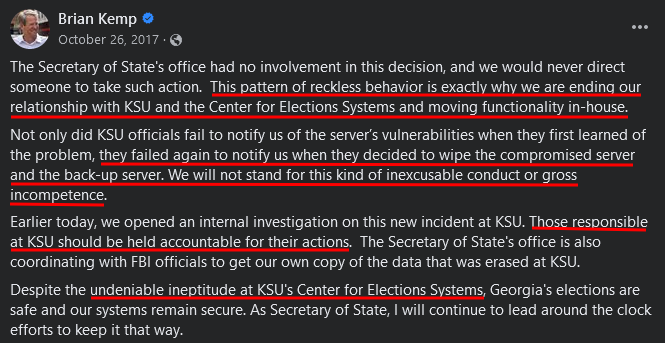Part 2-Raffensperger and Kemp Cannot Be Trusted in 2024 Elections
Kemp's SAFE Commission Recommendations Never Made it Into Law
In Part 1 of this series, we established a framework to begin understanding the recent changes (since 2018) in the Georgia election system and why they were changed, at least ostensibly. For 15 years prior to 2018, the election system ran out of the Georgia Center for Election Systems located at Kennesaw State University. In 2018, Secretary of State Brian Kemp changed all that. Kemp closed down the Kennesaw operation and installed a new operation to run under the direct control of the Georgia Secretary of State. In doing so, Brian Kemp put himself overseeing his own next election.
An important reason for the Georgia election system operating under the auspices of Kennesaw State was for the election system to maintain “an arms-length working relationship with the Secretary of State and the vendor, ensuring both independence and objectivity in its work.” Maintaining an arm’s length between an election system and any candidate, especially the candidate in charge of the election system, he being the Secretary of State, seems pretty important from this seat. But, after the changes by then Secretary of State Brian Kemp in 2017, Georgia elections have been wholly administered and supervised by a political office holder elected under the very system he himself personally supervises and controls. That’s not good.
Just before making the change to bring the election operations under the full control of the Secretary of State, Kemp expressed outrage regarding alledged potential vulnerabilities at the KSU Center for Elections Center (CES), especially the wiping of data from the system, posting on Facebook,
Citing “reckless behavior” and a decision “to wipe the compromised server” as the very reasons for ending the SOS contract with CES, Kemp added that his office had opened an internal investigation, and that, “Those responsible at KSU should be held accountable for their actions.” He characterized the work at CES as “undeniable ineptitude.”
Yet, a week later, Kemp’s legal counsel Ryan Germany (you remember his name because he was the one on Raffensperger’s phone call with Trump after the 2020 election) cleared the the CES director against any wrong-doing in allowing the data to be wiped, stating very simply the data destruction was nothing other that standard procedure, VoterGA reporting in the Georgia Elections Data Destruction Audit,
“Throughout his posts, Secretary Kemp expressed anger at those actions by UITS and CES. He called the actions “reckless behavior,” “inexcusable conduct,” “gross incompetence” and “undeniable ineptitude.” Almost immediately, the Attorney General resigned from defending the Secretary in Curling v. Kemp while citing a conflict among the Defendants. By Monday, October 30, Secretary Kemp’s legal counsel, Ryan Germany, produced a report stating that the elections server data destruction was “standard procedure.”
So, as it turns out, the “reckless behavior, inexcusable conduct, gross incompetence and undeniable ineptitude,” which according to Kemp was the reason for closing CES and moving its functions directly under his personal control, according to Kemp’s new attorney of record, Ryan Germany, turned out to be certain election workers simply following “standard operating procedure.”
And within a week of publicly humiliating the operation of elections at the KSU CES, ostensibly undertaking an internal investigation, and vowing that heads were going to roll, instead, Secretary of State Kemp turned 180 degrees, placed a smile back on his face, and offered the individual most responsible for all that Kemp previously criticized so vehemently, offering to hire that same individual, CES Director Michael Barnes, to run his new in-house election system at the Secretary of State’s Office, VoterGA reporting,

Remember what FDR told us, “In politics, nothing happens by chance. If it happens, you can bet it was planned that way.” Why would Brian Kemp hire the guy he just characterized to the world as, “reckless,” “inexcusable,” “grossly incompetent” and “undeniably inept?” There is no rationale, other than to conclude the events under consideration here were solely designed to justify closing the KSU CES with the idea of placing its functions within the fingertips of Georgia’s Secretary of State to control.
The Work of Brian Kemp’s “SAFE Commission”
But let’s not stop there. As we discussed in Part 1, in April 2018 Secretary of State Brian Kemp announced the members of his new “SAFE” Commission, which he chaired, assigned the task of “conducting thorough discussions on all options – including the feasibility of using all hand-marked paper ballots to all electronic machines with a voter-verified paper trail – and travel the state to solicit feedback from stakeholders.” “SAFE” stood for “Secure, Accessible & Fair Elections.” Here in Part 2, we will look at two of the most vital SAFE Commission recommendations to see if they were actually incorporated into law.
SAFE Recommendation #1
“Georgia should adopt a voting system with a verifiable paper vote record. Every effort should be made to implement this system statewide in time for the 2020 election. The system should create an auditable paper record for every vote that the voter has an opportunity to review before casting. Rules should be put in place ensuring a rigorous chain of custody for these paper records, as are in place now for security of paper ballots and memory cards.”
HB-316 (2019), enacted into law in response to SAFE Commission recommendations, DOES require a “verifiable paper record readable by the voter before casting.” Importantly, however, the law DOES NOT require an “auditable paper record for every vote that the voter has an opportunity to review before casting.” I say that because, requiring an “auditable paper record that the voter can check before casting” anticipates that the paper record the voter checks before casting would be the same record counted and audited. The law does not require that. Instead the law left the determination of recount methods to the State Board of Elections, each member of which appointed by, and beholden to, the Secretary of State.
Thus, respecting Recommendation #1, the work Secretary of State Kemp’s SAFE Commission undertook completed an utter waste of time. The very purpose of having a voter check his or her selections, is the expectation that those checked selections would become the data collected by the machine and used in anyrecount effort. That requirement did not make it into law and is not the procedure the present ballot marking device system undertakes. Instead, the machines in use since 2020 interpret QR codes which the voter has no way of verifying prior to submitting a ballot for scanning.
So, who was the Chairman of the SAFE Commission?
Brian Kemp
Who is the governor who signed HB316 into law without requiring his own vital SAFE Commission recommendations to be incorporated?
The same Brian Kemp
Conclusion: As chairman of the SAFE Commission, Brian Kemp knew purpose of the SAFE Commission. He knew the SAFE Commission recommendations, yet he did not require those recommendations be strictly incorporated into the law. Thus, not only can Brian Kemp not be trusted, but neither can the voting system he subsequently purchased pursuant to the law he signed.
SAFE Recommendation #7
“Georgia should require post-election, pre-certification audits. These audits will certainly be time consuming and add work to county election officials, but they are necessary to show transparency and maintain trust in the elections process…Election audits should rely on a paper vote record that is easily readable without a technical device, should be conducted on different machinery than Election Day tabulation, and should be conducted publicly.”
SAFE Commission recommendation #7 is a vital cross-check to ensure free and fair elections. However, the law Governor Kemp signed does not require any cross-checking provision SAFE Recommendation #7 advised. Post-certification audits are not required under HB316 and are performed entirely at the discretion of the Georgia Board of Elections, in other words, the Secretary of State. There is no requirement that a post-certification audit use any method other than minimally running the same pieces of paper back through the same scanning machines.
So, once again,
Who was the Chairman of the SAFE Commission?
Brian Kemp.
Who is the governor who signed HB316 into law without requiring his own vital SAFE Commission recommendations to be incorporated?
Brian Kemp.
Assembling the SAFE Commission was simply an act of political “hoop-jumping.” Brian Kemp knew what he wanted to do with Georgia’s voting system all along. Assembling the SAFE Commission was not a rash decision. This was a “justifying” decision, necessary before the new election system could be purchased and deployed. Kemp used the SAFE Commission report, written under his chairmanship, justified by the narrative of poor work being performed at KSU, to accomplish a procedure of creating a legal framework, within which the present ballot-marking device election system could be purchased and deployed.
Conclusion
I provide this analysis to help lift the veil to understand what is really going on in Georgia’s elections. First, as we learned in Part 1, given the opportunity provided by the narrative of “reckless behavior, inexcusable conduct, gross incompetence and undeniable ineptitude,” Brian Kemp justified taking all control of the election process away from the disinterested 3rd party running Georgia elections for the previous 15 years, Kennesaw State University, and placed complete control of the system under the hand of the Secretary of State and his people, allowing the Secretary of State virtual control over not only his or her own election, but conceivably all elections in Georgia.
Secondly, Brian Kemp went to the trouble to assemble the SAFE Commission, spending taxpayer funds to pay those good people and to send them throughout the state to listen to as many voters and election officials as time would allow. He bought them food and drink, paid for their lodging and transportation. And the SAFE Commission actually preformed a reasonable job for what it was. Why then didn’t newly-elected Governor Brian Kemp, formerly the chair of his own SAFE Commission, require every SAFE Commission recommendation to be incorporated into the law he signed? The only reasonable answer is that Brian Kemp did not want those recommendations made law. Kemp had the power and he did not use it to legislate mandatory safeguards for Georgia elections when he had the chance. Instead, he carried out a de facto fake crusade for free and fair elections, ending up with what we have now. Thus, we know Brian Kemp cannot be trusted to aid in creating any semblance of a free and fair election process in Georgia.
Next, in Part 3, we will look at the process underwhich the present ballot-marking device system was selected, purchased and deployed, and contemporaneous objections to Kemp’s decision.








Absolutely outstanding, Hank. Thank you for keeping ‘We the People’ informed!
Not only is Brian Kemp not to be trusted, he needs to resign in disgrace. This comment comes from someone knowing his daddy and stepmother, Faye, both of whom would roll over in their Graves at such despicable behavior.